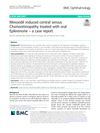 June 2016 in “Makedonski medicinski pregled”
June 2016 in “Makedonski medicinski pregled” A man who drank too much hair growth medication got very sick but got better after hospital treatment.
 August 2010 in “The Journal of Dermatology”
August 2010 in “The Journal of Dermatology” The document concludes that low-dose acne treatment is most suitable for moderate acne, with high patient satisfaction and low relapse rates.
March 2023 in “Journal of Cosmetic Dermatology” Low-dose oral minoxidil improved hair growth when topical treatments failed.
 July 2019 in “Dermatología Cosmética, Médica y Quirúrgica”
July 2019 in “Dermatología Cosmética, Médica y Quirúrgica” Small injections of dutasteride improved hair thickness in men with hair loss without major side effects.
 January 2007 in “Revista del Centro Dermatológico Pascua”
January 2007 in “Revista del Centro Dermatológico Pascua” Hair loss in women, often not related to male hormones, increases with age and can cause significant emotional distress.
 January 2025 in “Biomedical Engineering Letters”
January 2025 in “Biomedical Engineering Letters” MXD@CP could be a promising new topical treatment for hair loss.
 32 citations,
December 2017 in “Journal of Drug Delivery Science and Technology”
32 citations,
December 2017 in “Journal of Drug Delivery Science and Technology” Minoxidil and caffeine in transfersomes improve hair growth treatment.
 198 citations,
October 2011 in “Journal der Deutschen Dermatologischen Gesellschaft”
198 citations,
October 2011 in “Journal der Deutschen Dermatologischen Gesellschaft” Use minoxidil for hair loss; finasteride and dutasteride for men, dutasteride for women.
 149 citations,
April 2004 in “Journal of Dermatological Science”
149 citations,
April 2004 in “Journal of Dermatological Science” Minoxidil boosts hair growth by increasing cell production and survival.
 31 citations,
October 2002 in “Dermatologic Surgery”
31 citations,
October 2002 in “Dermatologic Surgery” Minoxidil helps stabilize hair loss, increase density, and reduce shedding after hair transplant surgery.
 4 citations,
June 2020 in “BMC Ophthalmology”
4 citations,
June 2020 in “BMC Ophthalmology” Minoxidil can cause a rare eye condition, but it was successfully treated with oral Eplerenone in one case.
 1 citations,
February 2017 in “MOJ bioequivalence & bioavailability”
1 citations,
February 2017 in “MOJ bioequivalence & bioavailability” Treating hair loss effectively may require a multi-sided approach, using different treatments together, and topical treatments could be more effective and safer than oral ones.
 October 2018 in “InTech eBooks”
October 2018 in “InTech eBooks” The most effective treatments for hair loss are minoxidil, finasteride, PRP, and hair transplants, with steroids and immunosuppressants for autoimmune types.
 18 citations,
December 1996 in “Seminars in Cutaneous Medicine and Surgery”
18 citations,
December 1996 in “Seminars in Cutaneous Medicine and Surgery” Chemotherapy and cytokine therapy can cause various skin reactions, including hair loss and hypersensitivity.
 3 citations,
January 2000
3 citations,
January 2000 Some alternative therapies for vitiligo show promise but need more research.
 2 citations,
December 2022 in “Journal of toxicologic pathology”
2 citations,
December 2022 in “Journal of toxicologic pathology” Skin structure complexity and variability are crucial for assessing skin toxicity in safety tests.
 2 citations,
July 2018 in “Elsevier eBooks”
2 citations,
July 2018 in “Elsevier eBooks” Some supplements may help with hair loss, but there's not enough strong evidence to recommend them without doctor advice.
 1 citations,
January 2015 in “Springer eBooks”
1 citations,
January 2015 in “Springer eBooks” AGA is a common hair loss disorder, and early diagnosis and treatment with minoxidil or finasteride can help reduce emotional distress.
 June 2023 in “International journal of science and research”
June 2023 in “International journal of science and research” PRP injections help hair regrowth safely but may need more research.

The review found that PRP is the most effective treatment for hair loss with few side effects.
 January 2017 in “Springer eBooks”
January 2017 in “Springer eBooks” Over 40% of postmenopausal women experience hair loss, with treatments aiming to stop further loss and possibly thicken hair.
 March 2014 in “CRC Press eBooks”
March 2014 in “CRC Press eBooks” Some nutrients and antioxidants may improve skin and hair health, but more research is needed to confirm these benefits.
 November 2020 in “Postepy Dermatologii I Alergologii”
November 2020 in “Postepy Dermatologii I Alergologii” Sulfotransferase SULT1A1 activity may predict minoxidil treatment success for hair loss.

RCVS should be considered in thunderclap headaches, and MRA and DSA are better for diagnosis than CT angiogram.
1 citations,
July 2022 in “JEADV Clinical Practice” New and existing treatments for hair loss show promise, with some being more effective for men and others for women.
 June 2024 in “Journal of cosmetic dermatology”
June 2024 in “Journal of cosmetic dermatology” Dutasteride is the most studied alternative drug for androgenetic alopecia, but more high-quality research is needed.
January 2022 in “Clinical Cases in Dermatology” Chemotherapy can cause significant but usually reversible hair loss, and managing it involves patient education and hair care strategies.
66 citations,
February 2007 in “The journal of investigative dermatology/Journal of investigative dermatology” Adenosine may promote hair growth by increasing FGF-7 levels in dermal papilla cells.
 25 citations,
June 2020 in “Dermatology practical & conceptual”
25 citations,
June 2020 in “Dermatology practical & conceptual” Scalp cooling can help prevent hair loss from chemotherapy, but treatment should be tailored to the individual and more research is needed.
 5 citations,
January 2020 in “Journal of Dermatology and Dermatologic Surgery”
5 citations,
January 2020 in “Journal of Dermatology and Dermatologic Surgery” Caffeine may benefit skin and hair health but more research is needed to confirm its effectiveness in dermatology.


























